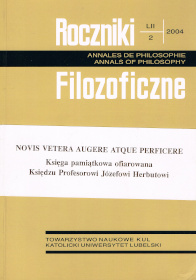Filozofowanie w kontekście języka. Refleksje w związku z dociekaniami AnnyWierzbickiej
Abstrakt
The linguistic studies written by Anna Wierzbicka have been an occasion for the remarks on the relationship between linguistics and philosophy and for the question whether linguistic enquiries entitle us to put forward philosophical theses. In particular, whether and to what extent we indeed learn something philosophically significant about the world (of culture) and the nature man and his mind by examining language. Defining here position as interdisciplinary, Wierzbicka draws on the studies of the relationship between language and culture, language and mind (language is a mirror of the mind – Leibniz). She claims that philosophy can be made a reliable science, provided it is based on linguistics, and the results of linguistic analyses can be found at the grounds of philosophical theses. Such philosophical references are A. Wierzbicka's attempts to combine semantics with generativism (Chomsky). Her intention to bring about a holistic description of language through defining elementary expressions (concepts, meanings), the so-called indefinibilia (“primitives”) can also be called philosophical in character. They suffice to define all the remaining expressions, and basic universal syntactic constructs in the form of a grammar of elementary units, i.e. the ways of combining elementary units into greater wholes. We think that Wierzbicka's procedure, her quest after primary elements (of language) are reducing. A. Wierzbicka's main idea, with regard to the relationship between language and mind, may be understood as follows: this is a Janus-faced relationship – one face (empirically accessible) is language, the other one is the mind accessible through investigations on language. Both “faces” (spheres) are somehow functionally “glued together”. In fact, however, Wierzbicka speaks little about the philosophically comprehended nature of man, whereas she speaks much about linguistic varieties and similarities among people. Generally speaking, while she declares herself to be a linguist, she has a philosophical temper and ambitions to generalise, i.e. she conducts linguistic studies with an intention to arrive at philosophical theses (by examining language she wants to obtain knowledge about the world and man). She issues statements which go beyond a purely linguistic knowledge and strictly linguistic data, hence they are not made legitimate by the linguistic material itself. A. Wierzbicka does not explain in more detail her way of understanding philosophy, assuming its intuitive comprehension. From some contexts it can be deduced that she takes it to mean a worldview. Should we call some parts of her reasoning a philosophy, it is then not a realistic philosophy but subject-oriented (first-person philosophising), such that touches upon the problems of the borderline between linguistics and philosophy, more concerned with the axis language-user than language-the world. Simultaneously, it is a non-demarcated and non-autonomic philosophising, exactly within the context of science, for it takes advantage of the results of empirical sciences to pose philosophical theses. The belief that philosophy can be pursued within a linguistic context coincides with the approach of analytical philosophy with its linguistic turn. Despite her declarations to make philosophy more scientific, Wierzbicka's arguments on behalf of the generalised (philosophical) theses are more their illustration and explication than a decisive legitimacy. Her belief that one can find some common, primitive linguistic units (simplicia) in the form of a complete set of independent concepts for all languages of the world seems utopian. It is difficult to do it even in deductive systems, constructed by way of the axiomatic method and with a finite set of initial expressions.
Copyright (c) 2004 Roczniki Filozoficzne

Utwór dostępny jest na licencji Creative Commons Uznanie autorstwa – Użycie niekomercyjne – Bez utworów zależnych 4.0 Międzynarodowe.





